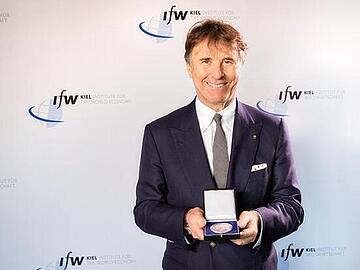Global Economy Prize Laureate 2017
Brunello Cucinelli

Brunello Cucinelli was born on September 23, 1953, in Castel Rigone, a small village near Perugia in Umbria. Cucinelli grew up on a farm, where there was no electricity, sewerage, or running water. His father worked on the land and later took a job in a factory. The fact that his father had to work very hard but earned very little and was treated quite badly was a formative experience in his life, says Cucinelli.
Cucinelli started studying engineering, but dropped out in 1977 to pursue an interest in philosophy. He met his future wife, Federica Benda, from the neighboring village of Solomeo, whose family produced textiles in their own home with the family serving as the labor force—something that is still common in the region today. Umbria is known for its knitted goods and Cucinelli founded his own fashion company in 1978 with the idea of selling quality cashmere sweaters in bright colors. In the first year, he sold more than 50 sweaters, which he saw as a great success. His breakthrough came at the fashion fair in Munich, which landed him nearly 12,000 orders.
In 1982, he moved his company to the impoverished and partially dilapidated village of Solomeo. He employs family businesses in the region in the production of his cashmere products. In 1985, he bought the castle in Solomeo, where the company headquarters is still located today. By offering fair pay and access to education and art, Cucinelli seeks to give both his employees and the people of the region a renewed sense of dignity and vitality. He has gradually purchased additional buildings and plots of land around Solomeo, working to restore the village by building a new library, neo-humanist academy, an amphitheater, and a theater. In order to expand production capacity, he has also renovated dilapidated factory buildings.
In 2012, he launched Brunello Cucinelli S.p.A. on the Milan Stock Exchange. Cucinelli continues to seek to protect his local region from decline and give the population hope for the future. By establishing a school of arts and crafts, he aims to preserve traditional skills and give artisanal work new prestige. He purchases unused industrial sites around Solomeo as part of the "Project for Beauty" and converts them into parks, sports facilities, and space to cultivate fruit, vegetables, wine, and olives. In the wake of the devastating earthquake that hit central Italy in late 2016, he provided millions of euros to rebuild destroyed villages and the Benedictine monastery of Norcia.
Brunello Cucinelli S.p.A. is now valued at around EUR 1 billion on the Milan stock exchange. The company generates sales of approximately EUR 400 million a year and employs some 1,000 families in Umbria. Cucinelli pays his employees approximately 20 percent above the median wage and work hours are limited to 8:00—17:30, including a one-and-a-half hour lunch break. The cheapest cashmere sweaters from Cucinelli sell for nearly EUR 1,000. Cucinelli is chairman and CEO of his company. He is married and has two daughters.